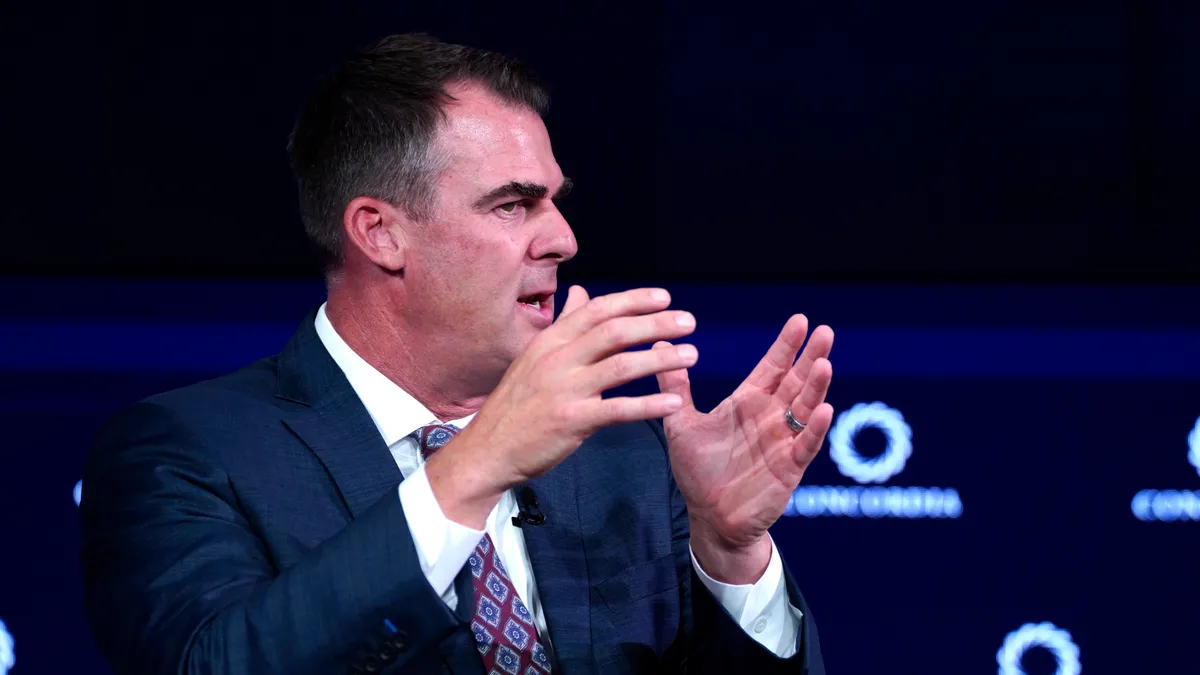The University of Oklahoma is again at the center of the state's crackdown on diversity, equity and inclusion, following allegations that one of its education courses may be violating Gov. Kevin Stitt's executive order barring mandatory DEI training or education at the state’s public colleges.
The class, titled Schools and American Culture, could run afoul of the governor's rule by "requiring future teachers to take racially charged coursework," according to allegations published by the Daily Caller, a conservative outlet.
Stitt, a Republican who has served as Oklahoma governor since 2019, shared the story on social media Monday, saying "It’s time to clean this up." Stitt's office did not immediately respond to questions Wednesday.
Which class is in question?
Schools in American Culture, also referred to as EDS 4003, is an upper-level undergraduate course required for at least one — but not all — of the education bachelor's degrees offered by the university, according to its webpage.
It gives specific attention to issues on "the cultural context of schooling, multiculturalism, current social and political issues, and, most importantly, student diversity within urban educational settings," per a copy of the syllabus published by the Daily Caller.
EDS 4003's listed objectives include reflection on personal biases, "sociopolitical powers, institutions, and forces that shape and impact the content of school curricula and learning." It prompts students to analyze "how various student differences (e.g., race, gender, class, sexual orientation, ability) impact educational experiences."
The Daily Caller also cited the course's instruction on critical race theory, or CRT, a decades-old academic concept that teaches racism is systemic.
In the early 2020s, conservative critics often referenced any educational instruction on race and ethnicity as CRT, despite the framework almost exclusively being taught at the college level, according to Pen America. The free speech group has accused lawmakers of using anti-CRT legislation to censor viewpoints they disfavor.
The rhetorical use of the term has since declined, though some free speech advocates say that anti-DEI legislation is being used in similar ways.
Some K-12 experts have pushed for future teachers to be educated in culturally competent teaching, a pedagogy designed to improve outcomes among marginalized students and decrease some of the challenges they face in school.
The Daily Caller alleges that some of the course’s requirements could run counter to Stitt’s order, which bars mandatory education that “grants preferences based on one person’s particular race, color, sex, ethnicity, or national origin over another’s.”
The publication said Saturday that the course may be in violation of the governor's ban on DEI programs that are “not necessary for compliance, accreditation, or student and employee support services intended to support success broadly.”
Heritage Action — an affiliate of The Heritage Foundation, a conservative think tank — described the University of Oklahoma's class as prioritizing "the needs of minority students over white students" in a social media post Monday.
An American Association of University Professors report cited The Heritage Foundation as one of 11 think tanks that have propelled the wave of anti-DEI legislation, as well as attacks on tenure and race- and gender-based instructional topics.
The Daily Caller's article appears to have caught Stitt's eye.
"Universities are more focused on pronouns than they are prepping for the workforce," Stitt said in a Monday social media post when sharing the story.
The University of Oklahoma on Wednesday said it is committed to “the presentation of materials viewpoint-neutral and non-discriminatory,” and that it seeks to teach students "how to think, not what to think."
The education course aims to give current and prospective educators the tools they need to be effective in public classrooms "in both rural and urban settings with students who reflect Oklahoma’s citizenry,” the university added.
"The rich history of the United States is complicated and unique, and it’s appropriate that coursework reflects that," the university said. EDS 4003 is designed to offer "a comprehensive overview" of the history of education in the U.S., including important educational theories and court cases, it said.
This is not the first time Oklahoma's flagship has made headlines related to Stitt's executive order.
Shortly after he signed it last year, the University of Oklahoma’s president announced the institution would be forced to eliminate all of its diversity offices. But civil rights organizations pushed back against the institution's interpretation of the order, calling it an “apparent leap to eliminate all DEI offices.”
The University of Oklahoma ultimately closed its gender and equality center and changed the function and name of its DEI office.
Critics of legislative crackdowns on DEI note that they often use broad language open to interpretation, spurring concerns that they will be used to undermine academic freedom.
Stitt's executive order leaves wiggle room for DEI programs required by federal law or accreditation standards. But the three-page directive led to different reactions among college officials.
Oklahoma State University’s president, for example, said after the order was issued that the institution likely wouldn’t need to make significant changes under the new rule.
Accreditors under fire
Stitt's comments Monday took a side-swipe at accreditation.
"Left-wing accreditation monopolies that peddle DEI curriculum hide out of sight and let liberal faculty call the shots,” Stitt said in the social media post.
In 2023, most major institutional accreditors were developing strategies to evaluate if colleges were serving historically disadvantaged students, according to The Chronicle of Higher Education.
Accreditor approval acts as the gateway to federal funds — a resource few colleges can live without. Stitt's executive order, for example, addressed this with the caveat allowing DEI at public colleges for accreditation purposes.
Like DEI, accreditation has become a common target of conservative ire.
A bill that would bar accreditors from requiring colleges to meet DEI standards has been sent to the Senate’s education committee. The House passed the legislation in September with a 213-201 vote that largely fell along party lines.
Florida Sen. Marco Rubio introduced a similar bill in June 2023, saying the accreditation process threatens colleges with "reputational and financial ruin” if they don’t comply with “wokeness.”
The same month, Ron DeSantis, governor of Rubio's home state, sued the U.S. Department of Education over accreditation and asked a federal judge to block the agency from enforcing federal accreditation requirements against Florida's colleges.
Those efforts haven’t proved successful.
In October, a judge dismissed DeSantis' case, though the state has since appealed. And neither legislative proposal has gained traction in the Democratic-controlled Senate.
However, Republicans will gain control of both chambers of Congress in January, as well as the executive branch, potentially paving the way for similar legislation in the future.















